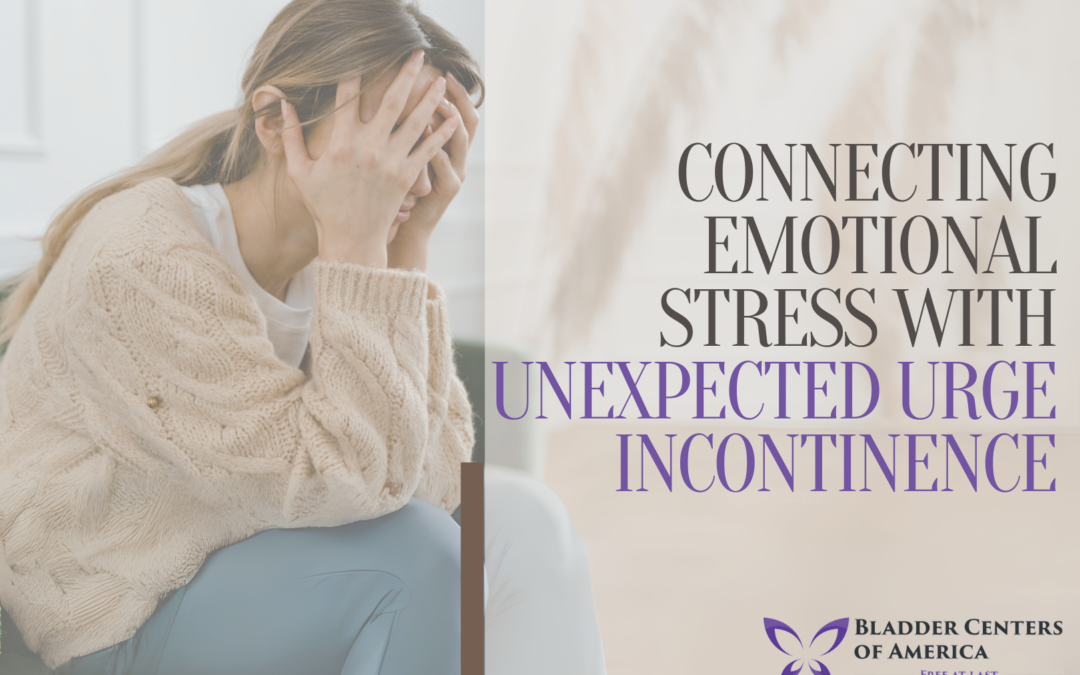Unexpected urge incontinence (UUI) is a type of urinary incontinence caused by an unexpected, sudden, and intense desire to urinate. It can be caused by many things, including physical factors, neurological disorders, or psychological conditions. Emotional stress is one key factor that can lead to symptoms of UUI, as the body reacts to it with physical responses such as increased heart rate and muscle tension which can cause incontinence. In this blog, we will discuss the symptoms of UUI caused by emotional stress, potential treatments, and how this type of incontinence differs from other types.
Definition of Unexpected Urge Incontinence
Unexpected urge incontinence (UUI) is a type of urinary incontinence caused by an unexpected and sudden desire to urinate. It is sometimes known as reflex incontinence, as it can be triggered by something other than the desire to urinate. Including physical triggers like laughter or coughing, or psychological triggers like fear or stress. Symptoms typically include feeling a sudden and urgent need to pass urine, which may involve the involuntary loss of urine. UUI can be very difficult to manage, particularly for those who suffer from chronic emotional stress.
Overview of how stress affects the body and can lead to incontinence
The body reacts to emotional stress in several ways, and this can have a physical impact. Common responses to stress include an increase in heart rate, breathing, and muscle tension. All of these responses can cause the bladder to become overactive, leading to increased contractions of the detrusor muscle – the muscle that controls urination – causing involuntary loss of urine (incontinence). The link between emotional stress and UUI is well-documented, so understanding how stress affects the body and its relationship with incontinence is key to managing symptoms.
Symptoms of Unexpected Urge Incontinence
Physical signs that may be caused by emotional stress
Emotional stress can manifest itself in various physical signs. Common symptoms include headaches, fatigue, increased heart rate, and muscle tension. People may also experience difficulty sleeping, changes in appetite, and a decrease in libido. In addition to these physical symptoms, people experiencing emotional stress may also exhibit behavioral changes. Examples of these include irritability or an inability to focus on tasks. If left untreated, emotional distress can have serious repercussions for both physical and mental health.
How does this differ from other types of incontinence?
Stress incontinence differs from other forms of incontinence in that it is caused by physical activity such as coughing, sneezing, or exercise. It is often associated with weakened pelvic floor muscles, which can be caused by childbirth, age, or lifestyle factors such as smoking and obesity. Stress incontinence is also different from urge incontinence, which is caused by the involuntary contractions of the detrusor muscle. Stress incontinence does not involve any involuntary contractions of the detrusor muscle but instead results from physical stressors on the body such as coughing or physical exertion.
Treatment Options for Unexpected Urge Incontinence
Exercise and relaxation techniques to manage stress and reduce symptoms
Exercise can be an effective way to manage stress and reduce the symptoms associated with it. Regular physical activity has been shown to improve mood, increase motivation, and help reduce anxiety. Additionally, exercise can help boost energy and enhance cognitive functioning. Relaxation techniques such as yoga, tai chi, and deep breathing can also help to manage stress by providing a break from the onslaught of worries associated with emotional distress. Engaging in calming activities such as listening to music or taking a leisurely walk may also provide some relief from stress-related symptoms.
Medications to treat incontinence directly
There are a variety of medications available to treat incontinence directly, ranging from anticholinergics to topical oestrogens. Anticholinergic medications help reduce bladder spasms and muscle contractions, while topical oestrogen creams can help to strengthen the urinary tract and improve bladder control. In addition, medications such as alpha-blockers and 5-alpha reductase inhibitors can be prescribed to treat incontinence related to an enlarged prostate or prostate cancer. Lastly, diuretics may be prescribed to increase the production of urine, which can help reduce the frequency of incontinent episodes.
In summary, it is important to understand the connection between emotional stress and unexpected urge incontinence. Regular physical exercise can help alleviate stress and reduce associated symptoms. In addition, there are a variety of medications that can be used to treat the condition directly.
Lastly, relaxation techniques such as yoga, tai chi, and deep breathing can also be beneficial in managing emotional distress. By understanding the cause-and-effect relationship between emotional distress and unexpected urge incontinence, individuals can more effectively manage their symptoms and find relief from the condition.

